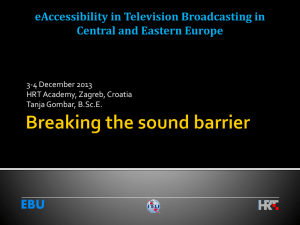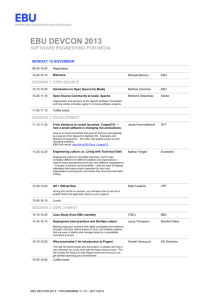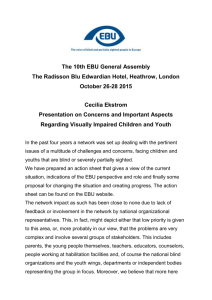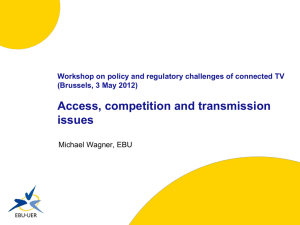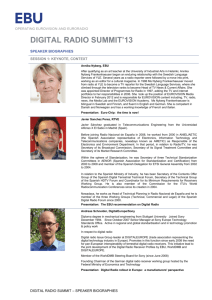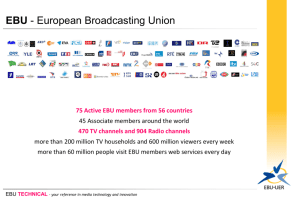working paper providing a general introduction on the Strategy
advertisement
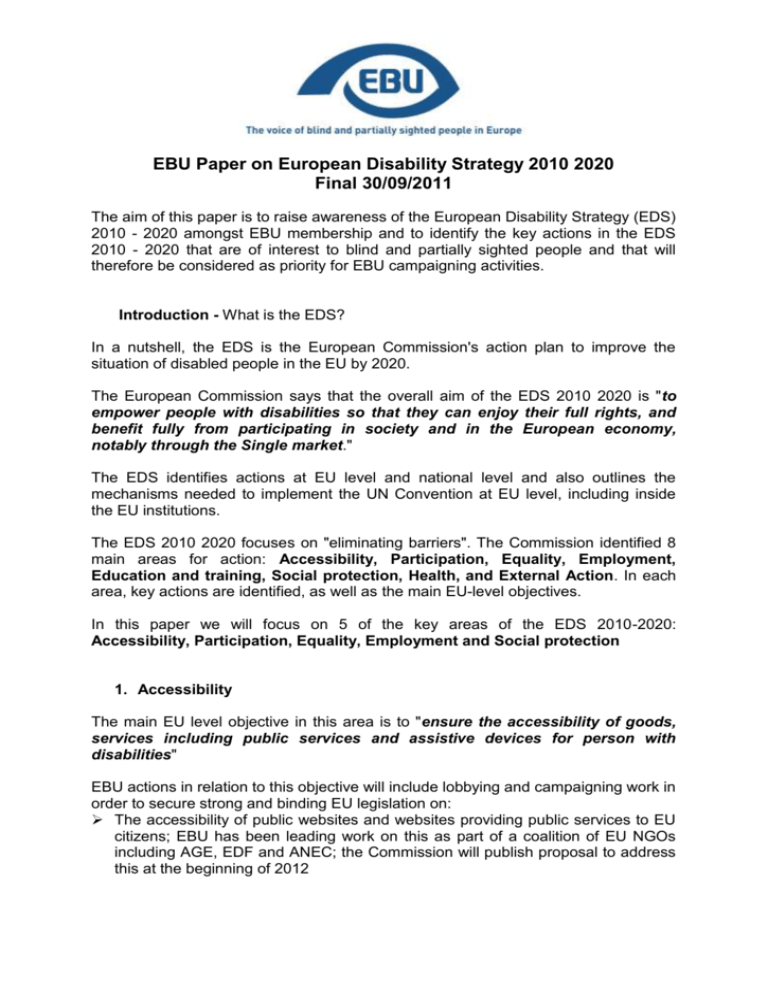
EBU Paper on European Disability Strategy 2010 2020 Final 30/09/2011 The aim of this paper is to raise awareness of the European Disability Strategy (EDS) 2010 - 2020 amongst EBU membership and to identify the key actions in the EDS 2010 - 2020 that are of interest to blind and partially sighted people and that will therefore be considered as priority for EBU campaigning activities. Introduction - What is the EDS? In a nutshell, the EDS is the European Commission's action plan to improve the situation of disabled people in the EU by 2020. The European Commission says that the overall aim of the EDS 2010 2020 is "to empower people with disabilities so that they can enjoy their full rights, and benefit fully from participating in society and in the European economy, notably through the Single market." The EDS identifies actions at EU level and national level and also outlines the mechanisms needed to implement the UN Convention at EU level, including inside the EU institutions. The EDS 2010 2020 focuses on "eliminating barriers". The Commission identified 8 main areas for action: Accessibility, Participation, Equality, Employment, Education and training, Social protection, Health, and External Action. In each area, key actions are identified, as well as the main EU-level objectives. In this paper we will focus on 5 of the key areas of the EDS 2010-2020: Accessibility, Participation, Equality, Employment and Social protection 1. Accessibility The main EU level objective in this area is to "ensure the accessibility of goods, services including public services and assistive devices for person with disabilities" EBU actions in relation to this objective will include lobbying and campaigning work in order to secure strong and binding EU legislation on: The accessibility of public websites and websites providing public services to EU citizens; EBU has been leading work on this as part of a coalition of EU NGOs including AGE, EDF and ANEC; the Commission will publish proposal to address this at the beginning of 2012 The accessibility of goods and services; this will involve work to influence the future European Accessibility Act, which the Commission is expected to propose in 2012. In addition, EBU will continue to participate in relevant standardisation work to underpin the forthcoming legislative acts in cooperation with ANEC, the consumer organisation for standardisation in Europe. 2. Participation The main EU level objective in this area is to "achieve full participation of people with disabilities in society by enabling them to enjoy all the benefits of EU citizenship; removing administrative and attitudinal barriers to full and equal participation; providing quality community-based services, including access to personal assistance." EBU actions in relation to this objective will include lobbying and campaigning work in order to ensure, inter alia: the adoption of an International WIPO treaty to ensure the free cross-border transfer of copyright work in accessible formats; the accessibility of voting; the free movement of blind and partially sighted people within the EU (tackle inaccessible transport through amendments to legislation and awareness raising where appropriate) 3. Equality The main EU level objective in this area is to "eradicate discrimination on grounds of disability in the EU" EBU actions in relation to this objective will include lobbying and campaigning work in order to ensure speedy and comprehensive compliance with the UN Convention of the Rights of Persons with Disabilities in all Member States. This work will be carried out in cooperation with EDF and other EU level organisations. 4. Employment The main EU level objective in this area is to "Enable many more people with disabilities to earn their living on the open labour market." EBU will continue to share information with the Commission on the barriers that blind and partially sighted people have to overcome to access and retain jobs. According to the European Commission the rate of employment for people with disabilities is only around 50%. EBU has carried out, in the framework of its strategic plan under the PROGRESS programme, a broad and detailed research titled “The Hidden Majority”, across several EU Member States. The outcomes of the research, which is still in progress, clearly show that the employment rate of blind and partially sighted people as well as the quality of jobs accessible to them vary from country to country. In order to achieve the EU’s growth targets, more people with disabilities, including blind and partially sighted people, need to be in paid employment on the open labour market. On the occasion of the 2009 Conference "Harnessing New ICT's as a Means to Ease the Job Inclusion of Visually Impaired Youth", organised by the EBU Youth Steering Group in the framework of the PROGRESS Programme, EBU started a cultural shift from waged employment to self-employment. EBU will continue developing this innovative employment perspective especially aimed at young job-seekers with a visual disability without neglecting, on the other hand, the traditional trend of these people to aim for stable employment. 5. Social Protection The Economic crisis in the European Union is having devastating effects on the social protection systems. The European Union's "Europe 2020" strategy has made social inclusion one of the three pillars to bring Europe out of the crisis. Nonetheless, the current economic, social and political measures adopted by Member States and the European Union may lead to an increase of social exclusion all over Europe. In fact, the progress towards the realisation of the rights of persons with disabilities enshrined in the UN Convention on the Rights of Persons with disabilities, the social targets of the Europe 2020 strategy and the European Disability Strategy 2010 – 2020 are being undermined. Poverty, social exclusion and discrimination are more and more widespread. This is also the case for blind and partially sighted people. The European Disability Strategy 2010 – 2020 envisages, among other things, ensuring decent living conditions for people with disabilities through access to social protection systems and poverty reduction programmes, disability-related assistance, etc.; reducing social exclusion by targeted support through concrete actions; assessing the adequacy of social protection systems with regard to people with disabilities; and ensuring the mainstreaming of disability-specific issues in all legislative measures concerning pensions and benefits portability. EBU will develop adequate initiatives to create a strong and long-lasting campaign to provide national members with appropriate instruments when undertaking appropriate actions in order to safeguard and improve the social protection schemes in their respective countries. Furthermore EBU will gather clear evidence of the living conditions of blind and partially sighted people in the EU countries and submit to the European Institutions (Commission, Parliament, Council) effective proposals to improve them. In addition, EBU will continue to monitor EU legal and case law developments regarding the exportability of benefits in order to ensure that Member States do not act in a way that undermines the freedom of movement of persons with disabilities. This document is supported by the European Union Programme for Employment and Social Solidarity - PROGRESS (2007-2013). This programme is implemented by the European Commission. It was established to financially support the implementation of the objectives of the European Union in the employment, social affairs and equal opportunities area, and thereby contribute to the achievement of the Europe 2020 Strategy goals in these fields. The seven-year Programme targets all stakeholders who can help shape the development of appropriate and effective employment and social legislation and policies, across the EU-27, EFTA-EEA and EU candidate and pre-candidate countries. For more information see: http://ec.europa.eu/progress The information contained in this publication does not necessarily reflect the position or opinion of the European Commission.





